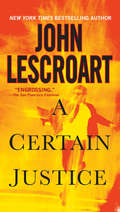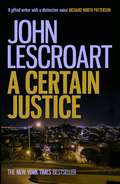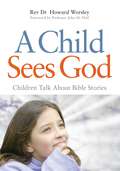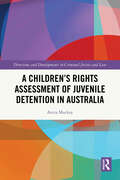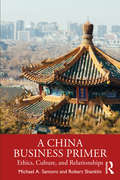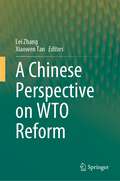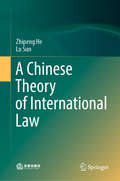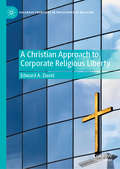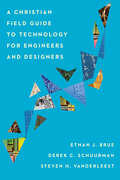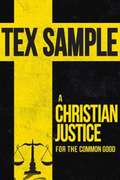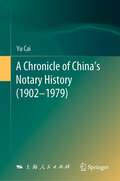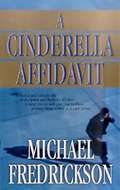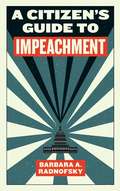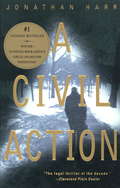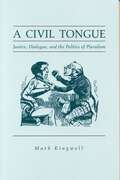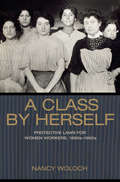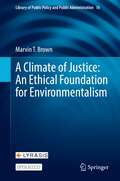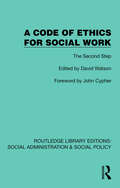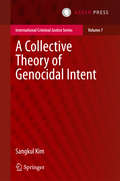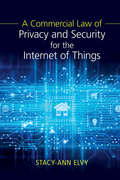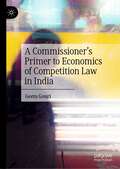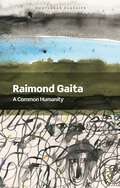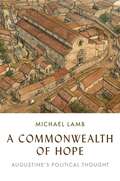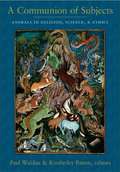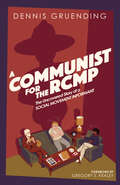- Table View
- List View
A Certain Justice
by John LescroartIn San Francisco - a city of tolerance and hope - everything came apart. One man died at the hands of another. The next victim was killed by a mob. Now fires burn in the night, helicopters throb through the air, and politicians, lawyers and cops vie for the remnants of power. Somewhere in the once-placid streets of San Francisco, a young man is on the run, charged by the media with a crime he didn't commit, hounded by demagogues, hunted by a desperate police department. One cop knows that Kevin Shea is innocent of a brutal racial murder. An ambitious politician will use Shea for her own ends. And a down-and-out lawyer is all that stands between Kevin Shea and an even more atrocious crime. For when there's no law left, justice is the only hope.
A Certain Justice: A thrilling murder mystery in the city of San Francisco
by John LescroartA brutal murder rocks a city. An innocent man stands accused. And justice is the next to die. A novel that examines the nature of justice - and injustice - follows an ordinary man who, through no fault of his own, is hounded, hunted, and almost destroyed for a crime he did not commit. Perfect for fans of Michael Connelly and Mark Nolan. 'Catapults Lescroart into the top ranks of crime writers' - PlayboyIn San Francisco--a city of tolerance and hope--everything came apart. One man died at the hands of another. The next victim was killed by a mob. Now fires burn in the night, helicopters throb through the air, and politicians, lawyers and cops vie for the remnants of power. Somewhere in the once-placid streets of San Francisco, a young man is on the run, charged by the media with a crime he didn't commit, hounded by demagogues, hunted by a desperate police department. One cop knows that Kevin Shea is innocent of a brutal racial murder. An ambitious politician will use Shea for her own ends. And a down-and-out lawyer is all that stands between Kevin Shea and an even more atrocious crime. For when there's no law left, justice is the only hope.What readers are saying about A Certain Justice:'A mystery thriller with twists and turns as fast as a bullet''You'll not be able to put the book down until you've read the last word''Compelling story of how justice can be manipulated by people in high places'
A Child Sees God: Children Talk About Bible Stories
by John Hull Howard WorsleyIn A Child Sees God, Howard Worsley explores how we can all learn from a child's perspective of the world and shows how a child's eye view of the Bible reveals many interesting ideas about ethics and morality, and provides new ways of understanding these ancient stories. By asking families to read Bible stories to their children and discuss these stories with them, recording the ensuing conversations, Howard Worsley offers not only fresh insights into the meaning and significance of these stories but also reflections on how adults can use the Biblical text in the company of children at different stages of development. Following the theory that all stories ever written fall into one of seven categories, this book shows that the themes of the Bible are no different, dividing stories into sections containing texts of wonder, adventure and leadership, terror, justice and judgement, comfort and hope, comedy, and mercy and forgiveness. This fresh look at the Bible through the eyes of children will be a fascinating read for parents, teachers, ministers, and anyone with an interest in child spirituality or ethics.
A Children’s Rights Assessment of Juvenile Detention in Australia (ISSN)
by Anita MackayCanvassing the socio-legal context for youth detention in Australia with a focus on international human rights law and legal frameworks within Australian states and territories, this book examines the recurring children’s rights-violations of recent years, and puts forward strategies for reform.Providing a comprehensive national picture of juvenile detention legislation, policy and practices using a children’s rights framework, this book is a detailed synthesis of investigatory reports, judicial decisions and inquiries by both Royal Commissions and parliamentary committee inquiries that together establish an evidence base for assessing the compliance of youth detention with Australia’s international and domestic human rights obligations. It also proposes nine pillars for reform to help Australia move towards children’s rights compliance.A Children’s Rights Assessment of Juvenile Detention in Australia provides an invaluable resource for policy-makers, lawyers and criminologists, as well as for students of law and criminology.
A China Business Primer: Ethics, Culture, and Relationships
by Michael A. Santoro Robert ShanklinThe COVID-19 pandemic underscored longstanding fissures in China’s business relationships with the West. If the West is going to develop a relationship of mutual trust and improve business relations with China in the coming decades, it is imperative to understand how to engage with Chinese thinking on ethics in business—this book explains how. Government officials, businesspeople, and business-ethicists have trouble communicating about issues in ethics, policy, and business across the China-West divide. This book shows how to overcome the us-versus-them mindset plaguing China-West relations by presenting to Western audiences an easy-to-understand yet deeply informed primer on core ideas and perspectives in Chinese cultural and philosophical thought. The book considers original texts of Chinese philosophy and religion, and applies principles from those writings to three business-ethics topics of enduring interest to business executives, government officials, and academics, namely, the protection of intellectual property, assurance of product safety and quality in the pharmaceutical supply chain, and human rights. This book is a must-read for those who want to forge constructive relationships with their Chinese counterparts based on mutual trust and understanding. The book is specifically relevant to business executives, but it should also be of interest to policymakers, educators, and students who seek to communicate more effectively with their Chinese counterparts, in particular about difficult and contentious business, policy, and ethical issues.
A Chinese Perspective on WTO Reform
by Lei Zhang Xiaowen TanThis book discusses the most recent developments in the WTO regime. Issues such as E-commerce, security exception clause, China's compliance with the WTO obligations, sustainability development, IP protection in FTZs, trade controls and etc., are at the forefront of WTO studies. These issues strongly influence people's understanding of the current role of WTO and provides possible way to revitalize the function of WTO. Meanwhile, as the world's second largest economy, the world's largest trading nation and the holder of the world's largest foreign exchange reserves, China is apparently a powerful figure in leading these issues. Therefore, this book explores extensively these issues from a Chinese perspective to see what China could do to reboost the world trade.
A Chinese Theory of International Law
by Zhipeng He Lu SunThis book analyzes China’s attitude to international law based on historical experiences and documents, and provides an explanation of China’s approaches to international legal issues. It also establishes several elements for a possible framework of Chinese theory on international law.The book offers researchers, university students and practitioners valuable insights into how China views international law and why it does so in the way it does.
A Christian Approach to Corporate Religious Liberty (Palgrave Frontiers in Philosophy of Religion)
by Edward A. DavidThis book addresses one of the most urgent issues in contemporary American law—namely, the logic and limits of extending free exercise rights to corporate entities. Pointing to the polarization that surrounds disputes like Burwell v. Hobby Lobby, David argues that such cases need not involve pitting flesh-and-blood individuals against the rights of so-called “corporate moral persons.” Instead, David proposes that such disputes should be resolved by attending to the moral quality of group actions. This approach shifts attention away from polarizing rights-talk and towards the virtues required for thriving civic communities. More radically, however, this approach suggests that groups themselves should not be viewed as things or “persons” in the first instance, but rather as occasions of coordinated activity. Discerned in the writings of Saint Thomas Aquinas, this reconceptualization helps illuminate the moral stakes of a novel—and controversial—form of religious freedom.
A Christian Field Guide to Technology for Engineers and Designers
by Derek C. Schuurman Ethan J. Brue Steven H. VanderLeestOur technology shapes the way we live, interact, work, play, and even worship.biblical themes and passages that relate to technologythe ethics and norms involved in technology designhow engineering and technology tap into human dreams for a better worldAlong the way they acknowledge the challenges arising from technology but also point to the wonderful possibilities it offers us and its ability to contribute to the common good. For Christians studying and working in engineering, computer science, technical design, architecture, and related fields, this book is packed with wisdom and practical guidance. By sharing what they have learned, the authors encourage readers to ask harder questions, aspire to more noble purposes, and live a life consistent with their faith as they engage with technology.
A Christian Justice for the Common Good
by Tex SampleDo Christians bring a unique, scriptural understanding of social justiceto bear on the ills of society? Would such an understanding reshape theway Christians engage and partner with others working to create a morejust world?Much of the modern conversation around creatingjustice focuses on ideas that too often reduce justice to human rights,procedural justice, and even the consumerism of the contemporaryculture/economy. While the priorities of human rights and due processare necessary for fashioning a just world, the Christian understandingof the common good is much richer and calls the church beyond fairnessto forms of liberation, compassion, mercy, and peace that are even moreradical than the best notions of justice that characterize thenation-state at the beginning of the 21st century.A Christian Justice for the Common Good describesa Christian justice for the common good and what it looks like on theground in real world settings. Calling Christians (individuals, as wellas communities of faith) to a concrete version of social well-beingbefitting faithful life in Jesus and God’s vision of justice for theworld, Tex Sample drills deeper and identifies the skills that must becultivated to do justice work with others—work that will create alasting impact while extending a Christian vision for the common good.Theconclusion? The freedom God offers in Christ finds its place inconcrete Christian efforts and the graced wherewithal of people who workgenerously with one another for a new and just life together.Contents include:1. The Reduction of Justice to Human Rights2. A Christian Justice3. The Formation of a Just Church4. Skills of Justice5. Doing Justice with Others6. A Justice of the Common Good
A Chronicle of China’s Notary History (1902–1979)
by Yu CaiThis book seeks to trace the notarial history of China from 1902 to 1979. While working on this trailblazing effort, the author taps into a rich variety of artifacts, especially the notarial documents, archived records, manuals and journals from private collection or originally issued by China’s judicial authorities during different periods. No similar book has been published so far. Many of these items are taken from old publications and notarial documents that the author purchased from grass-root vendors. The book complements the text with illustrations, and the descriptions of the same articles are consistent throughout narrative. Even more remarkable is that many rare notarial historical materials in Chinese and foreign languages are available for the first time. This book is a must-read for researchers and students need in their understanding of China’s judicial system or China’s history. It gives a complete introduction to the development and evolution of China’s notarial system, which has great reference value for those who study this subject.
A Cindarella Affidavit
by Michael FredricksonA routine drug bust goes awry in Boston's Chinatown, killing a police officer as he batters down the door to execute a no-knock search warrant. The police arrest the man, but the court orders them to produce the confidential snitch whose information was the basis for the bust. The search for the informant will plunge lawyers on both sides of the case into the legal battle of their byes. High-placed politicians, Chinese mobsters, and Boston's power elite will be dragged into court, their fates riding on the identity of this mystery informant, an informant known only as Cinderella.
A Citizen's Guide to Impeachment: A Citizen's Guide to Impeachment
by Barbara RadnofskyImpeachment is based upon “those offences which proceed from the misconduct of public men, or, in other words, from the abuse or violation of some public trust … as they relate chiefly to injuries done immediately to the society itself.” —Alexander Hamilton A non-partisan guide to a precise understanding of the rules and history of impeachment . . .Spotlighting in particular the precise rules of impeachment—including an explanation of the crucial grounds for impeachment, the famous “high crimes and misdemeanors”—the book also details its origins in British law, the rules as set out by the founding fathers in the Constitution, and their application throughout the history of our democracy.That history involves a detailed chronology of the nineteen instances of impeachment that have taken place—of judges, presidents, and officials from the cabinet and congress—throughout American history, including the very first impeachment conviction of an America official: that of a federal judge who seemed to have developed dementia.All of which makes A Citizen’s Guide to Impeachment a fascinating read about a unique aspect of our democracy, as well as a useful, one-of-a-kind guide for citizens in a participatory government.
A Civil Action: With Notes, Comments, And Questions
by Jonathan Harr"The legal thriller of the decade." --Cleveland Plain DealerNow a Major Motion Picture!In this true story of an epic courtroom showdown, two of the nation's largest corporations stand accused of causing the deaths of children. Representing the bereaved parents, the unlikeliest of heroes emerges: a young, flamboyant Porsche-driving lawyer who hopes to win millions of dollars and ends up nearly losing everything, including his sanity. A searing, compelling tale of a legal system gone awry--one in which greed and power fight an unending struggle against justice--A Civil Action is also the story of how one determined man can ultimately make a difference. With an unstoppable narrative power, it is an unforgettable reading experience.From the Trade Paperback edition.
A Civil Tongue: Justice, Dialogue, and the Politics of Pluralism (G - Reference, Information and Interdisciplinary Subjects)
by Mark KingwellThis book is about a widely shared desire: the desire among citizens for a vibrant and effective social discourse of legitimation. It therefore begins with the conviction that what political philosophy can provide citizens is not further theories of the good life but instead directions for talking about how to justify the choices they make—or, in brief, "just talking."As part of the general trend away from the aridity of Kantian universalism in political philosophy, thinkers as diverse as Bruce Ackerman, Jürgen Habermas, Alasdair MacIntyre, and Richard Rorty have taken a "dialogic turn" that seeks to understand the determination of principles of justice as a cooperative task, achieved in some kind of social dialogue among real citizens. In one way or another, however, each of these different variations on the dialogic model fail to provide fully satisfactory answers, Mark Kingwell shows. Drawing on their strengths, he presents another model he calls "justice as civility," which makes original use of the popular literature on etiquette and work in sociolinguistics to develop a more adequate theory of dialogic justice.
A Class by Herself: Protective Laws for Women Workers, 1890s-1990s
by Nancy WolochA Class by Herself explores the historical role and influence of protective legislation for American women workers, both as a step toward modern labor standards and as a barrier to equal rights. Spanning the twentieth century, the book tracks the rise and fall of women-only state protective laws--such as maximum hour laws, minimum wage laws, and night work laws--from their roots in progressive reform through the passage of New Deal labor law to the feminist attack on single-sex protective laws in the 1960s and 1970s. Nancy Woloch considers the network of institutions that promoted women-only protective laws, such as the National Consumers' League and the federal Women's Bureau; the global context in which the laws arose; the challenges that proponents faced; the rationales they espoused; the opposition that evolved; the impact of protective laws in ever-changing circumstances; and their dismantling in the wake of Title VII of the Civil Rights Act of 1964. Above all, Woloch examines the constitutional conversation that the laws provoked--the debates that arose in the courts and in the women's movement. Protective laws set precedents that led to the Fair Labor Standards Act of 1938 and to current labor law; they also sustained a tradition of gendered law that abridged citizenship and impeded equality for much of the century. Drawing on decades of scholarship, institutional and legal records, and personal accounts, A Class by Herself sets forth a new narrative about the tensions inherent in women-only protective labor laws and their consequences.
A Climate of Justice: An Ethical Foundation for Environmentalism (Library of Public Policy and Public Administration #16)
by Marvin T. BrownThis open access book helps readers combine history, politics, and ethics to address the most pressing problem facing the world today: environmental survival. In A Climate of Justice, Marvin Brown connects the environmental crisis to basic questions of economic, social, and racial justice. Brown shows how our current social climate maintains systemic injustices, and he uncovers resources for change through a civic ethics of repair and reciprocity. A must-read for researchers and educators in the area of environmental ethics and those teaching courses in the fields of public policy and environmental sustainability. With the support of more than 30 libraries, the LYRASIS United Nations Sustainable Development Goals Fund has enabled this publication related to SDG13 (Climate Action) to be available fully open access.
A Code of Ethics for Social Work: The Second Step (Routledge Library Editions: Social Administration & Social Policy)
by David WatsonOriginally published in 1985 the discussions in this book open up a series of important issues for the ethical practice of social work, including questions about the proper relations between personal and professional values, professional responsibility, relations between professionals and their employers, the rights of clients and the education appropriate to ethical social work practice.
A Collective Theory of Genocidal Intent (International Criminal Justice Series #7)
by Sangkul KimTackling one of the most confusing and controversial issues in the field of international criminal law -- i. e. , the genocidal intent element, this monograph seeks to develop an account of genocidal intent from a collectivist perspective. Drawing upon the two-layered structure of the crime of genocide composed of the 'conduct level' and 'context level', it detects the genocidal intent element at the 'context level'. The genocidal intent found in this manner belongs to a collective, which significantly departs from the prior individualistic understandings of the notion of genocidal intent. The author argues that the crime of genocide is not a 'crime of mens rea'. Collective genocidal intent at the 'context level' operates in a way that renders the crime of genocide itself a criminal enterprise. The idea of genocide as a criminal enterprise also suggests that genocide is a leadership crime in respect of which only the high-level actors can be labeled as principals (as opposed to accessories). The book criticizes the dominant individualistic approaches to genocidal intent (in particular: the knowledge-based approach) which have thus far governed the relevant jurisprudential and academic analysis. It further demonstrates that the hidden notion of 'collective genocide' silently governs the relevant international jurisprudence. Practitioners and academics in the field of international criminal law and related disciplines will find in this book a new approach to the crime of genocide. The text is the first-ever book-length exposition of a collective account of genocidal intent. Its accessibility is highly enhanced by relevant footnotes. Sangkul Kim is Lecturer at Korea University in Seoul and Research Fellow with the Centre for International Law Research and Policy (CILRAP). He served as Associate Legal Adviser at the Office of the Prosecutor of the International Criminal Court (2004-2008). He earned law degrees from Korea University and Georgetown University Law Center.
A Commercial Law of Privacy and Security for the Internet of Things
by Stacy-Ann ElvyIn the Internet of Things (IoT) era, online activities are no longer limited to desktop or laptop computers, smartphones and tablets. Instead, these activities now include ordinary tasks, such as using an internet-connected refrigerator or washing machine. At the same time, the IoT provides unlimited opportunities for household objects to serve as surveillance devices that continually monitor, collect and process vast quantities of our data. In this work, Stacy-Ann Elvy critically examines the consumer ramifications of the IoT through the lens of commercial law and privacy and security law. The book provides concrete legal solutions to remedy inadequacies in the law that will help usher in a more robust commercial law of privacy and security that protects consumer interests.
A Commissioner’s Primer to Economics of Competition Law in India
by Geeta GouriThis book is a primer on economics of competition law by a Commissioner based on cases of the Competition Commission of India (CCI). It presents economic theories in lucid ways while providing an in depth economic analysis of the cases dealt by CCI and in the process, it blends the diversity of responses by including the orders upheld by majority and minority. In essence. It is a unique work that addresses the gap between competition law and economics.
A Common Humanity: Thinking About Love and Truth and Justice (Routledge Classics)
by Raimond GaitaHolocaust denial, racism, genocide of indigenous peoples and the long-lasting harms inflicted by colonialism pose deep challenges to any idea of a common humanity. How can we include these and countless other examples of evil within our vision of a shared morality? These painful human incongruities are precisely what Raimond Gaita boldly harmonises in A Common Humanity. He discusses the complex and often fraught relations between hatred and forgiveness, evil and love, suffering and compassion, the mundane and the precious.Gaita asserts that our conception of humanity cannot be based upon the thin language of individual rights when it is our shared feelings of grief, hope, love, guilt, shame and remorse that offer a more potent foundation for common understanding.Drawing on the work of Hannah Arendt, Simone Weil, Primo Levi and Iris Murdoch, amongst others, Gaita creates a beautifully written and provocative new picture of our common humanity.This Routledge Classics edition includes a new Preface and a substantial Afterword by the author, in which he revisits some of the main themes of A Common Humanity and engages with responses to it since it was first published.
A Commonwealth of Hope: Augustine's Political Thought
by Michael LambA bold new interpretation of Augustine&’s virtue of hope and its place in political lifeWhen it comes to politics, Augustine of Hippo is renowned as one of history&’s great pessimists, with his sights set firmly on the heavenly city rather than the public square. Many have enlisted him to chasten political hopes, highlighting the realities of evil and encouraging citizens instead to cast their hopes on heaven. A Commonwealth of Hope challenges prevailing interpretations of Augustinian pessimism, offering a new vision of his political thought that can also help today&’s citizens sustain hope in the face of despair.Amid rising inequality, injustice, and political division, many citizens wonder what to hope for in politics and whether it is possible to forge common hopes in a deeply polarized society. Michael Lamb takes up this challenge, offering the first in-depth analysis of Augustine&’s virtue of hope and its profound implications for political life. He draws on a wide range of Augustine&’s writings—including neglected sermons, letters, and treatises—and integrates insights from political theory, religious studies, theology, and philosophy. Lamb shows how diverse citizens, both religious and secular, can unite around common hopes for the commonwealth.Recovering this understudied virtue and situating Augustine within his political, rhetorical, and religious contexts, A Commonwealth of Hope reveals how Augustine&’s virtue of hope can help us resist the politics of presumption and despair and confront the challenges of our time.
A Communion of Subjects: Animals in Religion, Science, and Ethics
by Kimberley Patton Paul Waldau Eds.A Communion of Subjects is the first comparative and interdisciplinary study of the conceptualization of animals in world religions. Scholars from a wide range of disciplines, including Thomas Berry (cultural history), Wendy Doniger (study of myth), Elizabeth Lawrence (veterinary medicine, ritual studies), Marc Bekoff (cognitive ethology), Marc Hauser (behavioral science), Steven Wise (animals and law), Peter Singer (animals and ethics), and Jane Goodall (primatology) consider how major religious traditions have incorporated animals into their belief systems, myths, rituals, and art. Their findings offer profound insights into humans' relationships with animals and a deeper understanding of the social and ecological web in which we all live.Contributors examine Judaism, Christianity, Islam, Hinduism, Buddhism, Jainism, Daoism, Confucianism, African religions, traditions from ancient Egypt and early China, and Native American, indigenous Tibetan, and Australian Aboriginal traditions, among others. They explore issues such as animal consciousness, suffering, sacrifice, and stewardship in innovative methodological ways. They also address contemporary challenges relating to law, biotechnology, social justice, and the environment. By grappling with the nature and ideological features of various religious views, the contributors cast religious teachings and practices in a new light. They reveal how we either intentionally or inadvertently marginalize "others," whether they are human or otherwise, reflecting on the ways in which we assign value to living beings. Though it is an ancient concern, the topic of "Religion and Animals" has yet to be systematically studied by modern scholars. This groundbreaking collection takes the first steps toward a meaningful analysis.
A Communist for the RCMP: The Uncovered Story of a Social Movement Informant
by Dennis GruendingIn 1941, the RCMP recruited Frank Hadesbeck, a Spanish Civil War veteran, as a paid informant to infiltrate the Communist Party. For decades, he informed not only upon communists, but also upon hundreds of other people who held progressive views. Hadesbeck’s “Watch Out” lists on behalf of the Security Service included labour activists, medical doctors, lawyers, university professors and students, journalists, Indigenous and progressive farm leaders, members of the clergy, and anyone involved in the peace and human rights movements. Defying every warning given to him by his handlers, Hadesbeck kept secret notes. Using these notes, author Dennis Gruending recounts how the RCMP spied upon thousands of Canadians. Hadesbeck’s life and career are in the past, but RCMP surveillance continues in new guises. As Canada’s petroleum industry doubles down on its extraction plans in the oil sands and elsewhere, the RCMP and other state agencies provide support, routinely branding Indigenous land defenders and their allies in the environmental movement as potential terrorists. They share information and tactics with petroleum industry “stakeholders” in what has been described as a “surveillance web” intended to suppress dissent. A Communist for the RCMP provides an inside account of Hadesbeck’s career and illustrates how the RCMP uses surveillance of activists to enforce the status quo.
